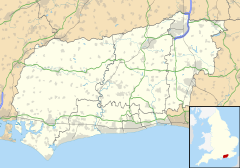Tillington, West Sussex
| Tillington | |
|---|---|
 All Hallows |
|
| Tillington shown within West Sussex | |
| Area | 14.16 km2 (5.47 sq mi) |
| Population | 501 2001 Census 524 (2011 Census) |
| • Density | 35/km2 (91/sq mi) |
| OS grid reference | SU962219 |
| • London | 42 miles (68 km) NNE |
| Civil parish |
|
| District | |
| Shire county | |
| Region | |
| Country | England |
| Sovereign state | United Kingdom |
| Post town | PETWORTH |
| Postcode district | GU28 |
| Dialling code | 01798 |
| Police | Sussex |
| Fire | West Sussex |
| Ambulance | South East Coast |
| EU Parliament | South East England |
| UK Parliament | |
| Website | http://www.tillington.net/ |
Tillington is a village and civil parish in the District of Chichester in West Sussex, England located one mile (1.6 km) west of Petworth on the A272. The parish includes the hamlets of Upperton, River, and River Common.
The land area is 1,416 hectares (3,500 acres). Approximately 500 people live in 227 households in the parish (2001 census). Upperton and Tillington are designated Conservation Areas. There are many old dwellings, including medieval timber framed houses, with one third of the buildings in the parish being grade II listed.Pitshill is a Georgian mansion standing at the head of a valley between Upperton and River. All Hallows Church with its unusual Scots crown tower is a landmark when approaching from Petworth, and is floodlit at night. It was painted by J. M. W. Turner and John Constable. The church, first recorded in 1100 was mostly rebuilt and enlarged between 1807 and 1837, but retains romanesque sculpture and a plain eight-sided twelfth century stone font. Opposite the church is the historic Horseguards Inn, thought to get its name from the cavalry who stayed there overnight while escorting gold bullion from London to the navy at Portsmouth.
The first reference to Tillington is in a title deed of 960, as Tullington, the farm or village founded by Tulla. Upperton (Upper Village) is first mentioned in 1191. Grittenham (Great Farm Enclosure), once a much larger settlement than today, is first mentioned in the Domesday Book, 1086, as Greteham. River (On the Slope) has also been called Treve through most of its history.
During the 16th century a great deal of common grazing land east of Upperton was illegally enclosed to make a deer park for Petworth House causing impoverishment of the farmers of Upperton. This resulted in a long running legal case against the Earl of Northumberland, owner of Petworth, described by Peter Jerrome in his book Cloakbag and Common Purse. The "common purse" was a fighting fund raised by the tenants to fund legal action in the Chancery court; the "clokebagge well fraught with money" was a large bribe to the tenants' leader to drop the case, after previously having had him press ganged into the army and sent to fight "beyond seas" which probably meant in Ireland, which he survived.
...
Wikipedia

